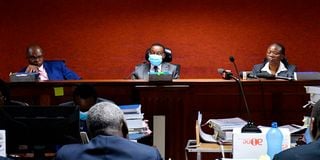CDF case fails to start as judge recused self

High Court Judges (from right) Roselyne Aburili, Kanyi Kimondo and Jairus Ngaah listen to proceedings before them on December 1, 2022 during the hearing of a case filed by activists on the legality of the National Government Constituency Development Fund (NG-CDF) Act of 2015.
Hearing of a case lodged by activists challenging legality of the National Government Constituency Development Fund (NG-CDF) failed to kick off after one of the judges recused himself.
This came as the court blocked various groups of university and college students from participating in the suit as interested parties on the strength of claims that they have stake in the dispute since they are beneficiaries of the CDF kitty.
The petition filed in 2016 by activists Wanjiru Gikonyo and Cornelius Oduor Opuot was scheduled for hearing before a three-judge bench comprising Justices Kanyi Kimondo, Jairus Ngaah and Roselyne Aburili. The case involves legality of the NG-CDF Act 2015.
But lawyers of the National Assembly led by Peter Kaluma and Dr Otiende Amollo forced Justice Ngaah out of the bench saying they were apprehensive he may be biased.
As a result the hearing was adjourned and the file was referred to the Chief Justice for reconstitution of the bench.
Also Read: MPs now target Uhuru-era laws for amendment
The lawyers said the judge was in another bench that last year found the initial Act, CDF Act 2013, unconstitutional over MPs’ failure to involve Senate during the enactment.
They said the suit filed by the activists also alleges that the 2015 Act is unconstitutional for various reasons including non-involvement of the Senate, which is also party to the suit.
“We want Justice Ngaah to recuse himself from hearing and determining this matter concerning constitutionality of the NGCDF Act 2015.
Justice Ngaah was part of a previous bench that adjudicated that very matter of the disputed Act. This case exposes the National Assembly to possibility of predetermination. Alternatively, it may call the judge to review his decision unawares,” said Mr Kaluma.
“The judge with his previous determination may find difficulties from escaping the previous determination. It does not give the National Assembly confidence that justice will be done,” said Mr Kaluma.
He added that the judge’s former law firm, Naikuni Ngaah & Miencha Co. Advocates, was representing one of the defendants.
Mr Kaluma said that although the judge left the firm in 2005 his name still appears there and should the judge make decision favourable the defendant being represented by the firm, it may be construed that he is favouring it.
The judge allowed the recusal application on one ground of having participated in the previous bench that handled a similar case.
“It is true that I sat in that bench and I presided over. I find merit in the application on this ground. Inasmuch the bench is of three, I find myself in awkward position assuming the rest of the judges hold a contrary opinion from the previous bench,” said Justice Ngaah.
Relating to the issue of his former law firm, the judge said he left the firm in 2005 to join the Ethics and Anti-Corruption Commission and later joined the Judiciary in 2012. He said he is not connected to the law firm.
In the case, the activists allege that NG-CDF Act 2015 violates the principle of separation of powers as it gives members of parliament roles which should be the preserve of the national government.
They say that Act violates Constitutional principles of public finance in many respects. This includes when the NG-CDF Act provides at Section 52 that the existence of another allocation by the national government to a project would not be good enough reason to deny any funding of a project under the NG-CDF Act.
Such duplication, it is contended is not in accord with the principle of prudent use of public resources and finances.
On a procedural aspect, the Petitioners contend that the Act and its implementation involve and concern the county governments with the meaning of Article 110(1)(a) of the Constitution.
They say the failure to involve the Senate in the legislation of the Act and additionally the failure to debate recommendations made by the Commission on Revenue Allocation violated the Constitution.
In sum, the Petitioners contend that the NG-CDF effectively creates a third level of government at the constituency level which is contrary to the Constitution.
It is also the petitioners’ case that the use of the NG-CDF in national government concurrent functional areas affects and interferes with county governments.
In these respects, the petitioners pointed to such services as sports, culture and environmental activities. The petitioners state that the NG-CDF undermines the functional integrity of county governments and further that the architecture of the NG-CDF Act failed to appreciate the Constitutional principle of division of functions.
Another claim is that Section 23 of the Act, which allows the National Assembly to get involved in the approval of the budget of the CDF Board is a violation of the principle of separation of powers.
Likewise, that the said Section 43 is also inconsistent with the constitutional doctrine of separation of powers in so far as the Members of the National Assembly got to nominate and approve members of the National Constituency Development Fund Committee.





